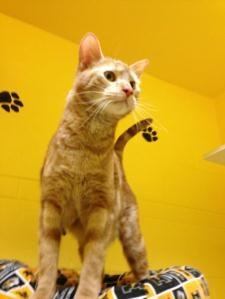
Our Blood Donors: Blood donors provide most of the blood used by our patients. These dogs and cats live in our hospital for one to three years before they are adopted to a forever home. All donors are carefully screened for infectious diseases including heartworm and tick-borne diseases. After whole blood is collected from the donor, it usually is separated into components such as packed red blood cells to maximize the number of patients that can benefit. Our dogs are considered universal donors, which benefits patients that need multiple transfusions. To see a bio and picture of the animal that donated blood for your pet, ask for its name and then visit the “Blood Donors of MU CVM” Facebook page.
About the disease
(Download as a PDF.)
Immune-mediated hemolytic anemia (IMHA) is a disease in which red blood cells, the cells that carry oxygen, are destroyed by the body’s immune system. The body misidentifies normal red blood cells as foreign invaders and destroys them faster than they can be replaced.
Reaching a diagnosis
This disease can have a sudden onset, so many pets are brought in on an emergency visit. Recognizing signs of anemia such as pale gums and weakness, a veterinarian will run a blood test that will reveal too few red blood cells (often referred to as packed cell volume or PCV). Once anemia is confirmed, your veterinarian will search for a cause. One of the most important parts of your visit will be reviewing your pet’s medical history, including a history of vaccines and medications. This will help reveal potential triggers that can be addressed in the treatment plan. However, in most cases an underlying trigger is not found.
What will hospitalization involve?
The initial treatment plan will likely include a combination of:
- Fluid therapy to prevent dehydration.
- Immunosuppressive therapy to stop red blood cell destruction. These medications may take several days to have an effect, so blood transfusions may be required in the meantime.
- An antibiotic to treat any potential infectious causes of IMHA. Screening tests may be falsely negative in early cases.
- Gastrointestinal protection to prevent stomach bleeding or ulcers.
- Anticoagulants may be used because IMHA patients are at risk for developing a blood clot in their lungs (pulmonary thromboembolism).
Blood transfusions
Packed red blood cells (pRBC) are the transfusion treatment of choice for IMHA patients. Because red blood cells carry oxygen to the body, an anemic patient may need transfused red blood cells to increase their oxygen-carrying capacity. The number of transfusions needed varies greatly. Repeat measurements of PCV will be required at least daily in order to assess treatment progress and the need for additional blood transfusions. A quick blood test to measure PCV levels can be very useful, but a complete blood count (CBC) will also be necessary at times to determine if your pet still has ongoing destruction of red blood cells.
Outlook
After a diagnosis of IMHA, your pet likely will require hospitalization in the intensive care unit to stabilize its condition and prevent complications. The length of time spent in the hospital will vary in each pet, but it can range from several days to a week in the most severe cases.
This is a serious disease with a guarded prognosis. Your veterinarian can discuss a specific prognosis for your pet, but death due to IMHA is not uncommon. However, many dogs do have long and healthy lives. Dogs surviving the initial two-week period have good long-term survival rates.
Whether your pet responds during the initial phase of treatment, there is always a risk of recurrence. Therefore, frequent recheck visits are required for pets living with IMHA. The PCV level will need to be monitored at least once a week for the first month.
Home monitoring will be important to monitor for signs of worsening anemia or pulmonary thromboembolism. If your pet experiences increased lethargy, vomiting, diarrhea, decreased appetite, collapse or difficulty breathing, see a veterinarian immediately.
Your pet will likely stay on medications for many months. The drug dose and frequency is gradually reduced until it can be stopped altogether. In some cases, medications may be continued for the pet’s entire life. Dose reductions will depend on your pet’s individual response to therapy. It is often possible for the veterinarians at the MU Veterinary Health Center to work with your local veterinarian to develop a long-term treatment plan. This means that your pet can be seen by his or her regular veterinarian rather than needing to return to the VHC for each recheck examination.



